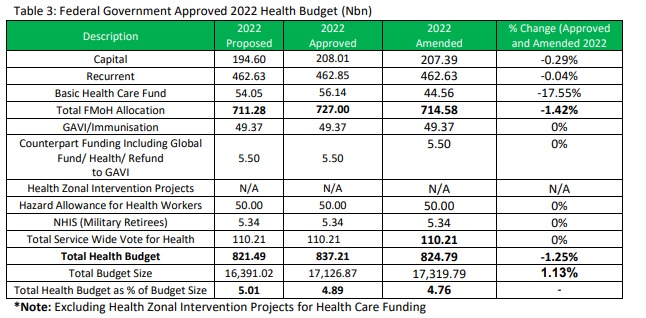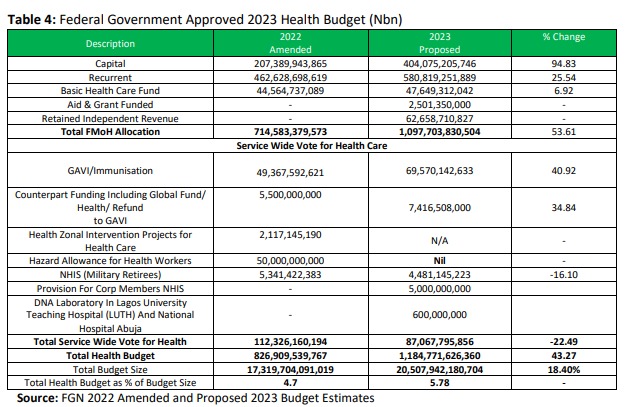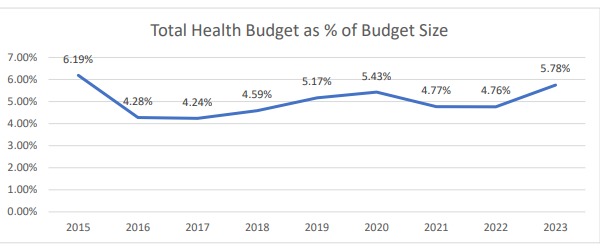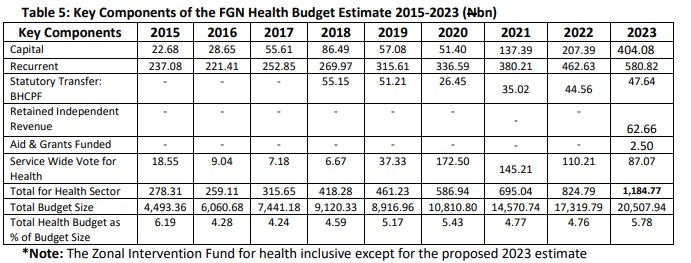dRPC tasks government on 2023 health budget; calls for quick releases of funds

By Daniel Adaji
In the 2023 budget, the health sector was allocated N1.17 trillion, but this has not changed the sloppy allocation and releases of health funds in the country, data analysis by the development Research and Project Centre (dRPC) has revealed.
FGN has only about three months to release all funds allocated to the sector
The not-for-profit organizaiton’s research shows that in spite of the increases, government is yet to appropriate the recommended 15% of the annual budget to health, in line with the African Union’s Abuja Declaration, meant to achieve the Universal Health Coverage in the continent.
The research by dRPC shows that Nigeria’s budget for the sector had been dwindling since 2015.
Although the allocation to the health sectors in the 2023 proposed budget witnesses an increase, it is still about 9% less than the 15% promised by the government, the research shows.

Source:dRPC
Also, the allocation in 2015 was 6.19%, about 0.4% above the proposed 2023 budget.
The dRPC document says: “the Federal Government of Nigeria amended the 2022 budget estimates in April 2022 as part of the need to accommodate the N2.56 trillion fuel subsidies and cut certain expenses for a realistic project implementation, given the dwindling revenue. As a result, the Federal Ministry of Health and its agencies’ budget was reduced by 1.4%.
The capital budget was reduced from N208.01bn to N207.39bn (representing a 0.29% reduction). The recurrent budget was reduced from N462.85bn to N462.63bn (representing a 0.204% reduction). The Basic Health Care Provision Fund (BHCPF) was also reduced from N54.05 to N44.56 (representing a 17.55% reduction). The overall health budget was reduced by 1.25% or N10.42bn. Thus, the health budget to budget size was also reduced from 4.88% to 4.76%”.

The report shows that relative to the other sectors, the health sector witnessed a higher reduction in the budget. This leaves a curious mind to wonder if the government does not take health seriously in the country.
The analysis of the proposed budget estimates revealed that the sum of N1.18 trillion was allocated to the health sector against the sum of N826.9 billion (presenting a 43.27% increase) in the 2022 amended budget.
The report said, while the capital health budget was increased by 94.83%, the recurrent health budget was also increased by 25.54%. There is a provision for retained independent revenue which could also help the sector to carry out some activities.

Source:dRPC
There is also the sum of N2.5 billion – a project tied to Aid & Grant for the procurement of the “Procurement and Installation of MRI Machine” at the Federal Teaching Hospital, Abakaliki. As apart from development, the health sector has the sum of N81.47 billion under the Service Wide Vote (namely N47.6bn for GAVI/Immunisation; N7.4bn for Counterpart Funding Including Global Fund/ Health/ Refund and N4.4bn for GAVI; and NHIS (Military Retirees), etc.
The report said, “The health budget increased from N278.31bn in 2015 to N1.18tn (representing a 325.7% increase) in 2023. The service wide vote for health increased from N18.55bn to N87.07bn (representing a 369.38% increase). The health recurrent budget was also increased from N237.31bn in 2015 to N580.82 in 2023, representing N144.75%. The health capital budget increased from N22.68bn in 2015 to N404.08bn in 2023, representing a 1,681.65% increase.”

It added that “The huge increase in the health budget shows some level of policy commitment over the 8 years period. However, the Basic Health Care Provision Fund (BHCPF) was reduced from N55.15bn in 2018 to N47.64bn in the proposed 2023 budget estimates. This was a 13.61% reduction. Thus, the funding increased by 6.92% compared to the N44.56bn allocation in the 2022 amended health budget.
Given the current finding commitment to the sector, the health per capita increased to N5,409 using the World’s population Review 2022 estimated population of 218 million for Nigeria. the health capital will be N5,724 if the NPC 206 million 2020 population estimates is adopted.

Source: dRPC
“Therefore, as of Q2 2022, only N32.79bn was released and cash backed (representing 15.81% of the total allocation) from the N207.39bn allocated as the health capital budget in 2022. Out of this released sum, only N4.65bn. The sum utilized constitutes 14.18% of the total released sums and only 2.24% of the total health capital allocation for the year.
“It is more worrisome given the guideline and instruction from the 2023 budget call circular clearly stating that the “Implementation of the 2022 Capital Expenditure budget is expected to close by December 31, 2022, as indicated in the 2022 Appropriation Act implementation Guidelines (HMFBNP/BOF/2022/AAIG/02/2022), in furtherance of the FGN’s commitment to maintain a predictable January – December fiscal period”.
This means that the FGN has only about three months to release all funds allocated to the sector for effectiveness and to achieve the key target and goals of the sector as contained in the National Development Plan 2021-2025 Issues on 2023 healthcare.”

Findings and Advocacy Issue
The findings from the dRPC’s analysis showed that Nigeria is far from its intended and expressed commitment to allocating 15% of its total budget to health. Despite the increase in allocation to the health sector, it is still below 15% of the Federal Budget.
There is also a clear indication that the healthcare investment per person has increased but is below 6,000 per capita. It was also established that despite an increase in budgetary allocation to the sector, there was a very poor release as well as a gross underutilization of the fund released. The findings also show that the federal government is planning to scale the Family Planning services and procure commodities through counterpart funding for 2023. In the same vein, the N1.117tn for the health sector in the 2023 fiscal year constitutes 71% of the total proposed N1.65tn public investment for the realization of the all-set goals outlined in the health sector in the National Development Plan from 2021-2025.
It is, however, recommended:
- That there is a need for adequate and timely releases of fund to the health sector in order to achieve the set goal of the national development plan as relate to the health care.
- There is a need to revisit the proposed investment plan for the sector in the National Development Plan, as it is counterproductive to the health budget estimates.
- The proposed investment for the sector should be realistic.
- There is also need to ensure timely publication of the heath budget implementation report for accountability.
- We call on the National Assembly to careful scrutinize the propose estimates to avoid duplication and wastage of the scarce resources.
- We also urge the National Assembly to increase funding to the sector from their annual N100bn Zonal Intervention Fund which in the 2023 amended budget stop at N2bn.
- The N20 million for the scale up of implementation of the national family planning programme, and services in 2023 are welcome development. However, the country needs more funding for the procurement of the FP commodities. This, the government should ensure to recreate the confidence and increase access FP commodities to bridge the unmet needs gaps.
Sign up for The Insight Newsletter
Get in-depth, research and data-based interpretative reports from around Nigeria.



